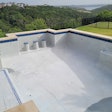The Consumer Product Safety Commission (CPSC) will meet tomorrow, Wednesday, September 28, to reevaluate its current position that a pool with an unblockable drain cover does not require an additional level of protection. The CPSC will vote on and possibly revoke this interpretation.
The proposed change would stipulate that in order for a drain to be unblockable, the sump opening must meet the same 18-by-23-inch size requirement as drain covers. In the years since the passage of VGB, pools with smaller sump openings have covered them with approved drain covers and thus complied with the law. The new interpretation would require these pools to install a secondary entrapment protection, such as a vent pipe, an SVRS, etc.
Some industry observers have stated that this change is unnecessary, pointed out that the vacillating rulings of the CPSC create an atmosphere of uncertainty, and noted that this strong blow to the finances of public pools diminishes their ability to provide the swimming instruction that prevents drowning, a much larger threat to public safety than entrapment.
In an open letter to the industry, the National Swimming Pool Foundation expressed alarm about the potential changes, citing "serious unintended consequences" if the original definitions are discarded. The NSPF is urging industry members to contact the CPSC and voice opposition to the changes.
Since the Virginia Graeme Baker Act was enacted, there have been no drain entrapment fatalities nor serious injuries in the United States, the NSPF argues, and changing the law will only create confusion in the market without adding any benefit.
"It is important that experts weigh in to help guide the CPSC on how best to minimize both entrapment AND drowning," the NSPF said in the letter. "The complete National Swimming Pool Foundation position is below or can be found here. If you support the NSPF position, please comment to the CPSC today. Alternatively, if you have other guidance, please forward it to the CPSC.
"All stakeholders who care about aquatics and public health agree that we must continue to work hard to have zero entrapments AND to work harder to reduce the thousands who drown each year.
"Please send your comments to the CPSC today. Their contact information is below. It is recommended that your Congressional Representative and/or Senators be copied on any correspondence sent to the CPSC."
Consumer Product Safety Commission 4330 East West Highway Bethesda, MD 20814
Troy Whitfield, Lead Compliance Officer [email protected]
Cheryl Falvey, General Counsel [email protected]
Kenneth Hinson, Executive Director [email protected]
Inez Tenenbaum, Chairman [email protected]
Robert Alder, Commissioner [email protected]
Thomas Moore, Commissioner [email protected]
Nancy Nord, Commissioner [email protected]
Hon. Anne Northup, Commissioner [email protected]
Below is the letter sent by NSPF to the lead compliance officer for the CPSC:
September 20, 2011
Mr. Troy Whitfield Consumer Product Safety Commission 4330 East West Highway Bethesda, MD 20814
Dear Mr. Whitfield:
RE: Revocation of the Interpretative Rule "Unblockable Drain"
The National Swimming Pool Foundation (NSPF), founded in 1965, is a 501(c)(3) non-profit organization dedicated to improving public health worldwide by attracting more people to safe aquatic environments and encouraging healthier living through aquatic education and research. NSPF is the leading research funder and educator for pool and spa professionals who service and operate public and private pools and spas and for public health officials who are responsible for pool safety. This research is disseminated via the World Aquatic Health Conference, which NSPF hosts, and the International Journal of Aquatic Research & Education, which NSPF publishes in partnership with Human Kinetics.
The Foundation works toward its educational mission with leading training programs like Certified Pool/Spa Operator certification training, Certified Pool/Spa Inspector online training, and the Pool & Spa Safety Act online training developed under contract with the CPSC. The Foundation has certified over 300,000 pool operators, managers, and health officials since 1965. In 2010 alone, over 25,000 people were trained.
Please do not revoke CPSC's interpretative rule on "unblockable drain" as suggested in 16CFR Part 1450. This position is justified based on three arguments:
-
Since the Pool & Spa Safety Act (P&SSA) was enacted, there have been no U.S. entrapment fatalities and no serious injuries to justify implementing a costly new requirement.
-
The unintended consequences of revoking this rule may increase the risk of drowning, thus conflicting with the intent of the law.
-
This change will create confusion in the market with no net benefit.
These justifications are further clarified below.
-
Lack of Scientific Support to Implement There have been no U.S. entrapment fatalities or serious injuries since the Pool & Spa Safety Act was enacted to justify implementing a costly new requirement. As a result, there is no scientific evidence to justify adding another level of protection when compliant unblockable drain covers have been used.
-
Unintended Consequences May Increase Drowning Risk The unintended consequences of this change may increase the risk of drowning, thus conflicting with the intent of the P&SSA. The nation has suffered the most severe economic recession since the Great Depression. Though justified, the Pool & Spa Safety Act and the Americans with Disabilities Act have placed an additional burden on aquatic facilities during a financially vulnerable time. In addition, the CPSC issued a recall prior to the 2011 swim season that resulted in new resource challenges for facilities to comply with the P&SSA.
Changing the P&SSA interpretation to require an additional level of protection for pools protected with compliant "unblockable drains" — when there are no failures that resulted in serious morbidity or mortality — places another financial burden on aquatic facilities. In contrast, this new requirement will provide a financial benefit to "safety equipment manufacturers" and "pool service/construction" companies. However, that benefit is at the expense of the aquatic facilities, making them more vulnerable to closure and thus shrinking the markets for manufacturers over time.
The National Drowning Prevention Alliance reported that for the period May 1, 2011, through August 26, 2011, a total of 1,592 drownings were noted by local media outlets. Public swimming pools play a key role in helping the general population learn to swim and for lifeguards to become trained and certified. Increasing arbitrary costs during difficult financial times has resulted in pool closures. Tragically, closures are more likely in economically-disadvantaged regions where drowning is a greater risk. Pool closures reduce the opportunity for many people to learn to swim, potentially increasing the risk of drowning. Thus arbitrary rule changes that impart cost should be avoided.
-
Confusion with No Net Benefit The CPSC has funded several millions of dollars with contractors to create and disseminate educational materials to consumers, industry, and health officials. Changing the interpretation after all training contracts have ended will create confusion. Additional confusion may occur since there have been no serious injuries or deaths, suggesting that the proposed rule change would be ill-justified.
This rule change and resulting pool closures provides another drawback that is in direct conflict with the commitments of the President of the United States and both Houses of Congress. Our representatives are in debate on how to stimulate the economy to create jobs. It appears to be a direct conflict of the wishes of our elected officials to implement a rule change with no net benefit that may increase drowning risk AND may increase unemployment.
NSPF respectfully asks that the CPSC reject the revocation of this interpretive rule until scientific evidence justifies the change and can demonstrate the change will not increase drowning risk.
Respectfully,
Thomas M. Lachocki, Ph.D. Chief Executive Officer National Swimming Pool Foundation 4775 Granby Circle Colorado Springs, Co 80919-3131 719-540-9119 (Phone) 719-540-2787 (FAX) [email protected]
cc: U.S. Consumer Product Safety Commission Cheryl Falvey, General Counsel Ken Hinson, Executive Director Inez Tenenbaum, Chairman Robert Alder, Commissioner Thomas Moore, Commissioner Nancy Nord, Commissioner Anne Northup, Commissioner
The Honorable Doug Lamborn, Colorado 5th Congressional District











































